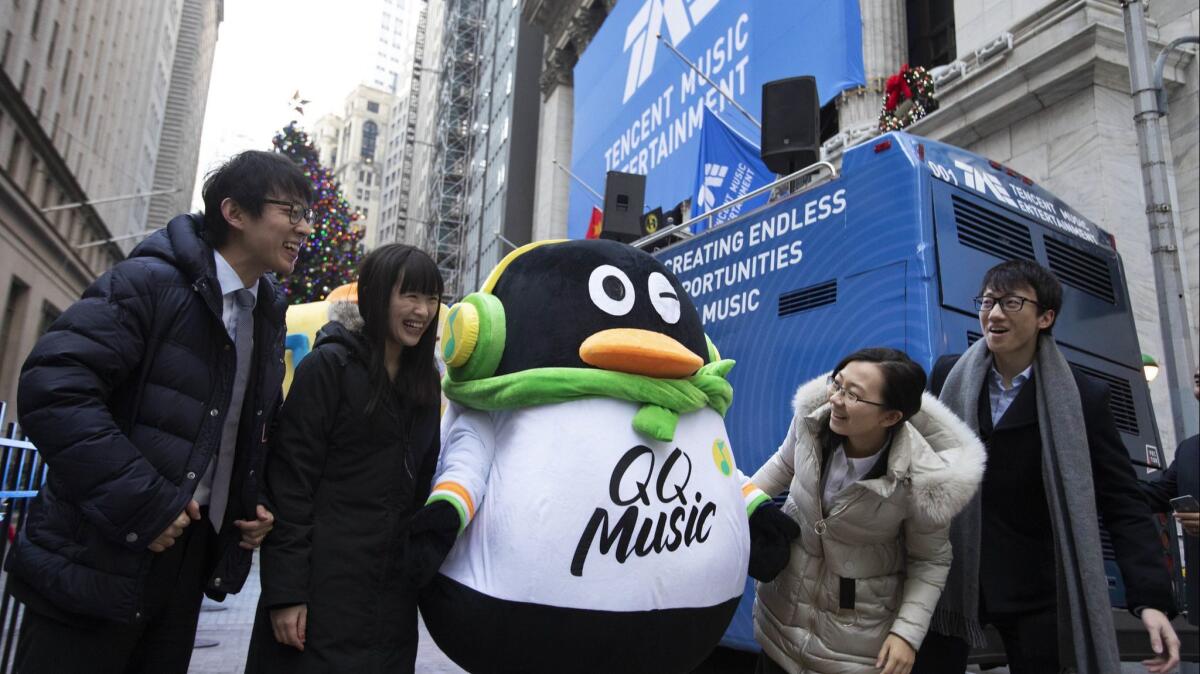Chinese streaming service Tencent Music climbs in trading after $1.1-billion IPO

Tencent Music Entertainment Group climbed in its U.S. trading debut Wednesday after pricing its initial public offering at the bottom of a marketed range.
China’s largest music-streaming service, which is backed by Tencent Holdings Ltd., raised $1.1 billion by selling 82 million American depositary shares at $13 apiece Tuesday. It had earlier said its expected pricing would be from $13 to $15.
Shares closed the day up $1, or 7.7%, to $14 on the New York Stock Exchange, valuing the company at about $22.9 billion — just below the market valuation of Spotify Technology, the Swedish peer that’s also an investor in the Chinese company.
Despite the gain, Tencent Music’s less-than-optimal IPO pricing doesn’t bode well for mainland China companies considering their own coming-out parties, and follows recent lackluster debuts by the likes of Mogu Inc.
“The pricing is primarily due to weak general market sentiment,” said Vey-Sern Ling, an analyst with Bloomberg Intelligence. “The secondary reason is market skepticism about music streaming platforms, due to the poor experience with Spotify, which is below its IPO price.”
The deal adds to the $8 billion raised in U.S. first-time share sales by Chinese companies this year, more than double the same period in 2017, data compiled by Bloomberg show.
It’s also the biggest year for mainland firms since 2014, when Alibaba Group Holding Ltd. priced the world’s largest IPO, the data show. In the coming year, major tech corporations from Uber Technologies Inc. to China’s ByteDance Ltd. are said to be considering IPOs, both to raise capital and offer longstanding backers an exit.
Tencent Music, the online-music arm of China’s largest social-media company, had been one of the year’s most anticipated initial offerings. Its growth in China mirrors inroads by Spotify in the U.S., where streaming has helped music sales grow at their fastest rate since the 1990s.
The Chinese company, however, has a more diverse business. It focuses on three main experiences: Online music through products such as QQ Music that also help users discover tunes; online karaoke sites such as WeSing, where people can sing virtually with friends, celebrities or strangers; and live-streamed performances. The company counted 872 million monthly active users, combining the music service and social entertainment platform, in the three months ended in June.
Its net income more than tripled in the first nine months of the year, to $394 million, while revenue nearly doubled to about $2 billion, according to an exchange filing. Its platforms are becoming important vehicles for pop stars such as Katy Perry and Rihanna to reach a Chinese audience, alongside homegrown artists such as Jason Zhang and Joker Xue.
Investors “do not understand fully that Tencent Music has a very different business model than Spotify, which allows it to make sustainable profits,” Ling said.
Major shareholders include Tencent, which owned about 59% before the offering. Spotify held about 8.9%, the filing shows. Morgan Stanley, Goldman Sachs Group Inc., JPMorgan Chase & Co., Deutsche Bank AG and Bank of America Corp. are among the underwriters of the offering.






